
air
The new Python web framework by the authors of Two Scoops of Django
Stars: 813
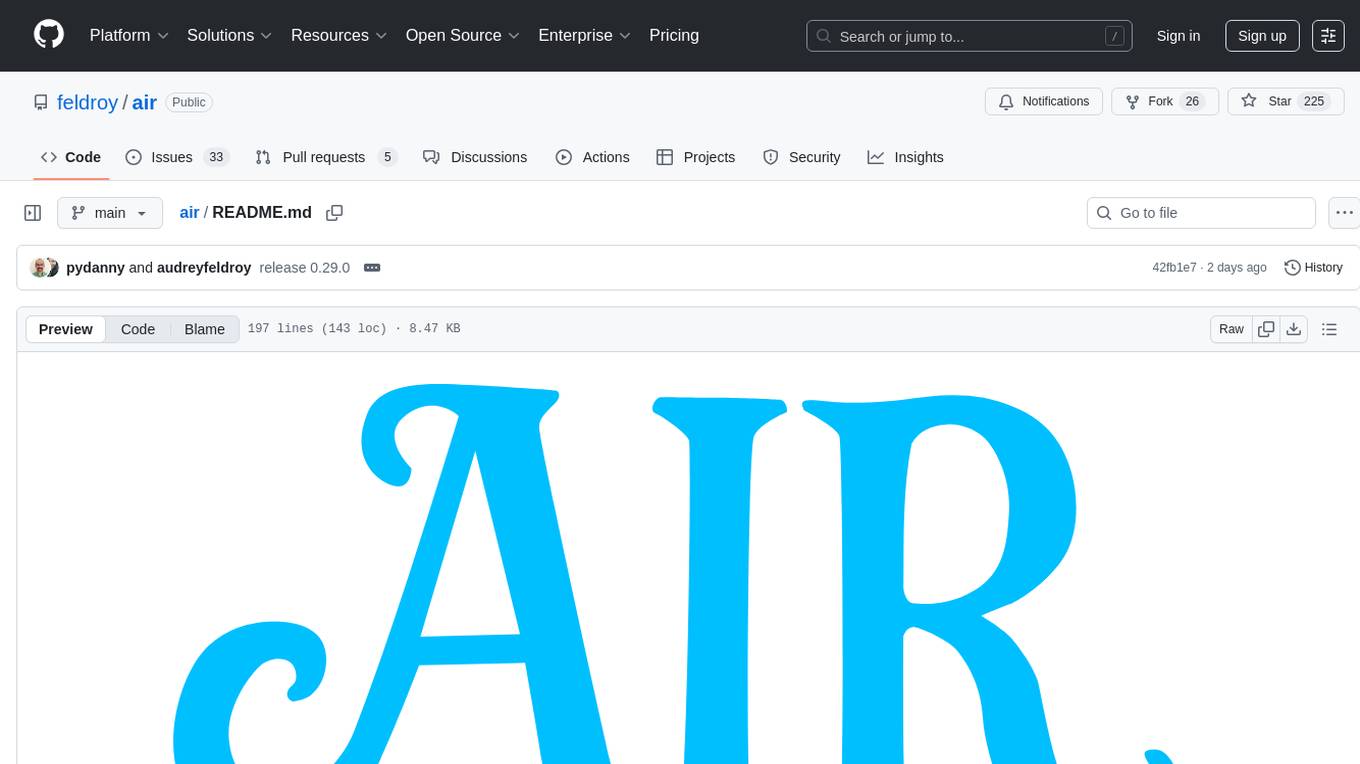
Air is a new web framework for Python web development, built with FastAPI, Starlette, and Pydantic. It provides intuitive shortcuts and optimizations to expedite coding HTML with FastAPI, easy HTML content generation using Python classes, and seamless integration with Jinja templates. Air also offers utilities for using HTMX, HTML form validation powered by pydantic, and well-documented features. It aims to combine sophisticated HTML pages and a REST API into one app, making it easy to use FastAPI and Air together.
README:
The web framework that breathes fresh air into Python web development.
Built with FastAPI, Starlette, and Pydantic.
[!CAUTION] Air is currently in an alpha state. While breaking changes are becoming less common, nevertheless, anything and everything could change.
[!IMPORTANT] If you have an idea for a new feature, discuss it with us by opening an issue before writing any code. Do understand that we are working to remove features from core, and for new features you will almost always create your own package that extends or uses Air instead of adding to this package. This is by design, as our vision is for the Air package ecosystem to be as much a "core" part of Air as the code in this minimalist base package.
- Powered by FastAPI - Designed to work with FastAPI so you can serve your API and web pages from one app
- Fast to code - Tons of intuitive shortcuts and optimizations designed to expedite coding HTML with FastAPI
- Air Tags - Easy to write and performant HTML content generation using Python classes to render HTML
-
Jinja Friendly - No need to write
response_class=HtmlResponseandtemplates.TemplateResponsefor every HTML view - Mix Jinja and Air Tags - Jinja and Air Tags both are first class citizens. Use either or both in the same view!
- HTMX friendly - We love HTMX and provide utilities to use it with Air
- HTML form validation powered by pydantic - We love using pydantic to validate incoming data. Air Forms provide two ways to use pydantic with HTML forms (dependency injection or from within views)
- Easy to learn yet well documented - Hopefully Air is so intuitive and well-typed you'll barely need to use the documentation. In case you do need to look something up we're taking our experience writing technical books and using it to make documentation worth boasting about
Documentation: https://docs.airwebframework.org
Source Code: https://github.com/feldroy/air
Install using pip install -U air or conda install air -c conda-forge.
For uv users, just create a virtualenv and install the air package, like:
uv venv
source .venv/bin/activate
uv init
uv add airYou can install each optional feature (extras) like this:
-
Standard — FastAPI’s recommended extras
uv add "air[standard]"
The library and its dependencies are available through Context7. For effective AI assistance, register the Context7 MCP server in your coding environment and configure your agent to use it.
You can also use:
For the canonical long-form context, please use: llms-full.txt, it follows the llmstxt format.
Create a main.py with:
import air
app = air.Air()
@app.get("/")
async def index():
return air.Html(air.H1("Hello, world!", style="color: blue;"))Run the app with:
air runIf you have fastapi installed globally, you may see an error:
To use the fastapi command, please install "fastapi[standard]":
pip install "fastapi[standard]"In that case, run the app with:
uv run air run[!NOTE] This example uses Air Tags, which are Python classes that render as HTML. Air Tags are typed and documented, designed to work well with any code completion tool. You can also run this with
uv run uvicorn main:app --reloadif you prefer using Uvicorn directly.
Then open your browser to http://127.0.0.1:8000 to see the result.
Air is just a layer over FastAPI. So it is trivial to combine sophisticated HTML pages and a REST API into one app.
from fastapi import FastAPI
import air
app = air.Air()
api = FastAPI()
@app.get("/")
def landing_page():
return air.Html(
air.Head(air.Title("Awesome SaaS")),
air.Body(
air.H1("Awesome SaaS"),
air.P(air.A("API Docs", target="_blank", href="/api/docs")),
),
)
@api.get("/")
def api_root():
return {"message": "Awesome SaaS is powered by FastAPI"}
# Combining the Air and FastAPI apps into one
app.mount("/api", api)Want to use Jinja2 instead of Air Tags? We've got you covered.
from fastapi import FastAPI
import air
from air.requests import Request
app = air.Air()
api = FastAPI()
# Air's JinjaRenderer is a shortcut for using Jinja templates
jinja = air.JinjaRenderer(directory="templates")
@app.get("/")
def index(request: Request):
return jinja(request, name="home.html")
@api.get("/")
def api_root():
return {"message": "Awesome SaaS is powered by FastAPI"}
# Combining the Air and and FastAPI apps into one
app.mount("/api", api)Don't forget the Jinja template!
<!doctype html>
<html>
<head>
<title>Awesome SaaS</title>
</head>
<body>
<h1>Awesome SaaS</h1>
<p>
<a target="_blank" href="/api/docs">API Docs</a>
</p>
</body>
</html>[!NOTE] Using Jinja with Air is easier than with FastAPI. That's because as much as we enjoy Air Tags, we also love Jinja!
Maintenance of this project is made possible by all the contributors and sponsors. If you would like to support this project and have your avatar or company logo appear below, please sponsor us. 💖💨
Consider this low-barrier form of contribution yourself. Your support is much appreciated.
For guidance on setting up a development environment and how to make a contribution to Air, see Contributing to Air.
Thanks to all the contributors to the Air 💨 web framework!
For Tasks:
Click tags to check more tools for each tasksFor Jobs:
Alternative AI tools for air
Similar Open Source Tools

air
Air is a new web framework for Python web development, built with FastAPI, Starlette, and Pydantic. It provides intuitive shortcuts and optimizations to expedite coding HTML with FastAPI, easy HTML content generation using Python classes, and seamless integration with Jinja templates. Air also offers utilities for using HTMX, HTML form validation powered by pydantic, and well-documented features. It aims to combine sophisticated HTML pages and a REST API into one app, making it easy to use FastAPI and Air together.
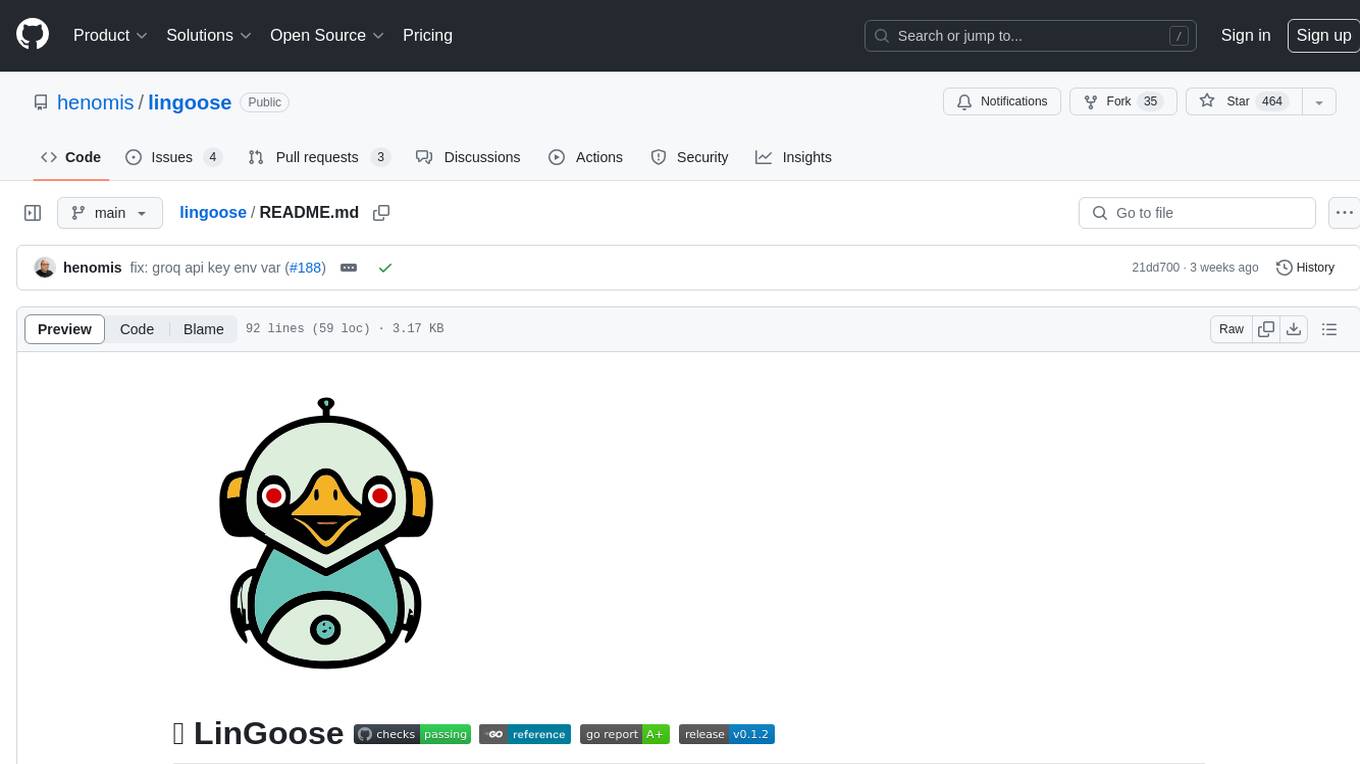
lingoose
LinGoose is a modular Go framework designed for building AI/LLM applications. It offers the flexibility to import only the necessary modules, abstracts features for customization, and provides a comprehensive solution for developing AI/LLM applications from scratch. The framework simplifies the process of creating intelligent applications by allowing users to choose preferred implementations or create their own. LinGoose empowers developers to leverage its capabilities to streamline the development of cutting-edge AI and LLM projects.
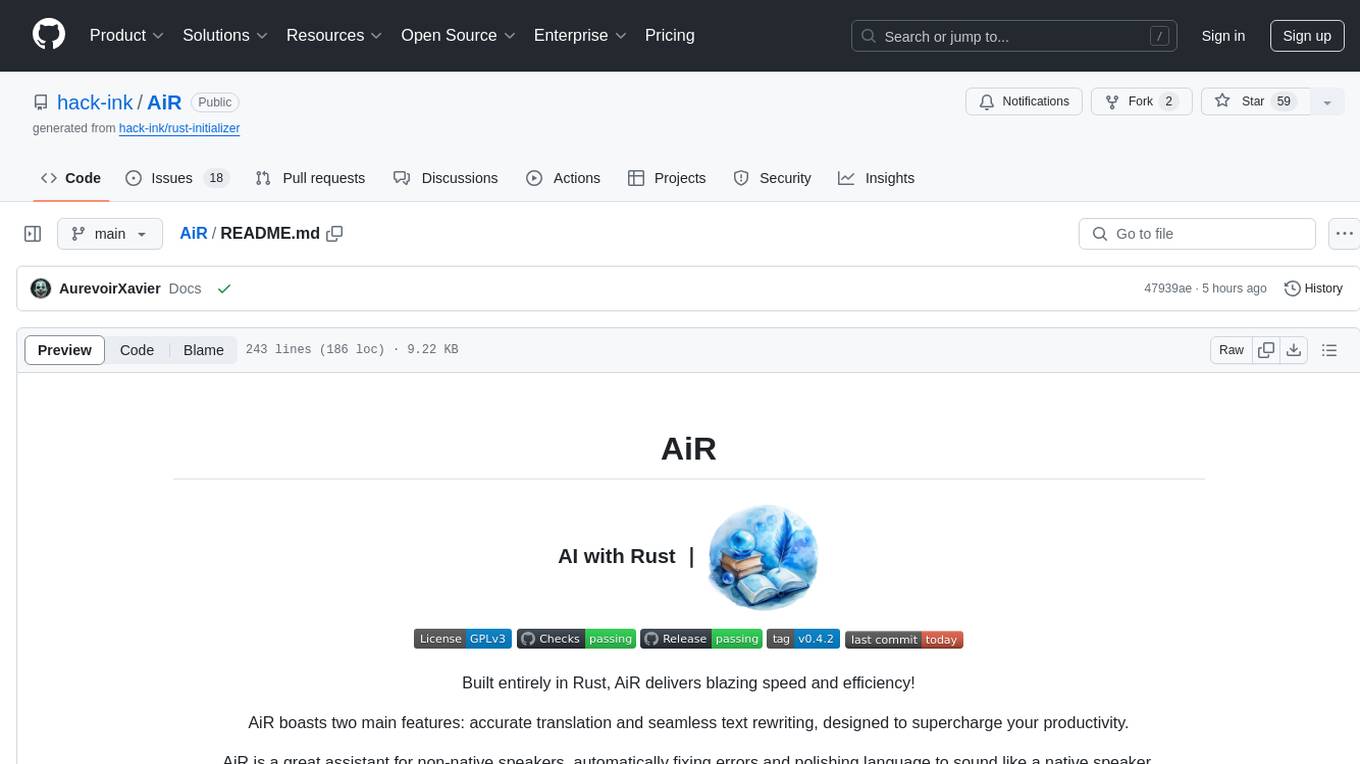
AiR
AiR is an AI tool built entirely in Rust that delivers blazing speed and efficiency. It features accurate translation and seamless text rewriting to supercharge productivity. AiR is designed to assist non-native speakers by automatically fixing errors and polishing language to sound like a native speaker. The tool is under heavy development with more features on the horizon.
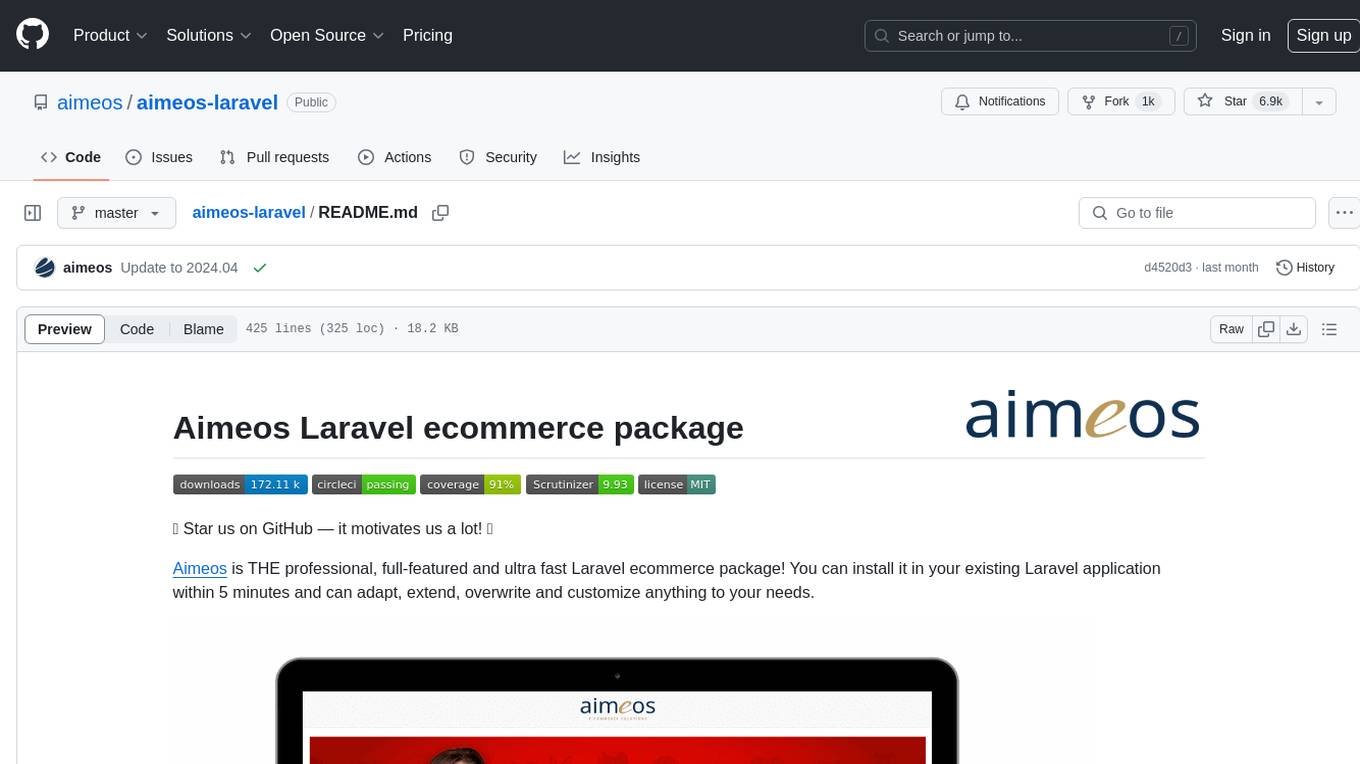
aimeos-laravel
Aimeos Laravel is a professional, full-featured, and ultra-fast Laravel ecommerce package that can be easily integrated into existing Laravel applications. It offers a wide range of features including multi-vendor, multi-channel, and multi-warehouse support, fast performance, support for various product types, subscriptions with recurring payments, multiple payment gateways, full RTL support, flexible pricing options, admin backend, REST and GraphQL APIs, modular structure, SEO optimization, multi-language support, AI-based text translation, mobile optimization, and high-quality source code. The package is highly configurable and extensible, making it suitable for e-commerce SaaS solutions, marketplaces, and online shops with millions of vendors.
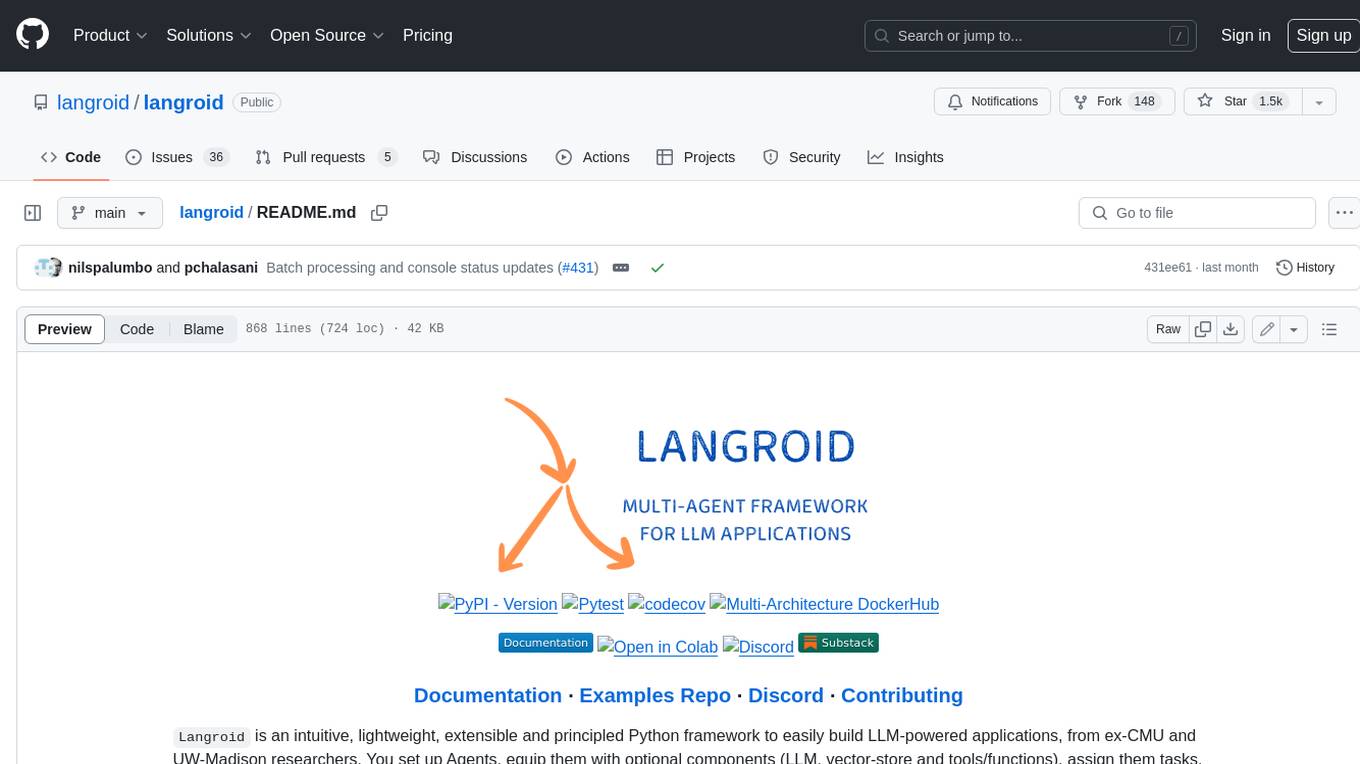
langroid
Langroid is a Python framework that makes it easy to build LLM-powered applications. It uses a multi-agent paradigm inspired by the Actor Framework, where you set up Agents, equip them with optional components (LLM, vector-store and tools/functions), assign them tasks, and have them collaboratively solve a problem by exchanging messages. Langroid is a fresh take on LLM app-development, where considerable thought has gone into simplifying the developer experience; it does not use Langchain.
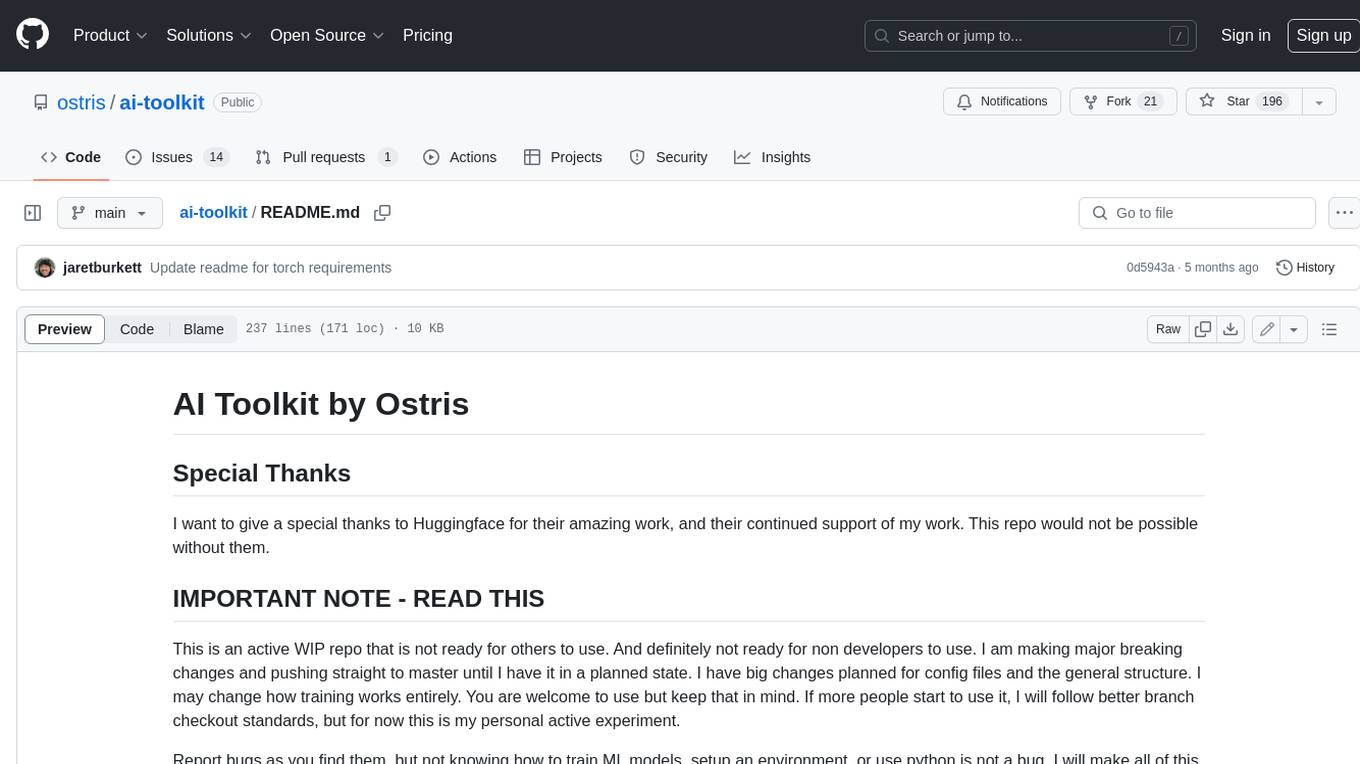
ai-toolkit
The AI Toolkit by Ostris is a collection of tools for machine learning, specifically designed for image generation, LoRA (latent representations of attributes) extraction and manipulation, and model training. It provides a user-friendly interface and extensive documentation to make it accessible to both developers and non-developers. The toolkit is actively under development, with new features and improvements being added regularly. Some of the key features of the AI Toolkit include: - Batch Image Generation: Allows users to generate a batch of images based on prompts or text files, using a configuration file to specify the desired settings. - LoRA (lierla), LoCON (LyCORIS) Extractor: Facilitates the extraction of LoRA and LoCON representations from pre-trained models, enabling users to modify and manipulate these representations for various purposes. - LoRA Rescale: Provides a tool to rescale LoRA weights, allowing users to adjust the influence of specific attributes in the generated images. - LoRA Slider Trainer: Enables the training of LoRA sliders, which can be used to control and adjust specific attributes in the generated images, offering a powerful tool for fine-tuning and customization. - Extensions: Supports the creation and sharing of custom extensions, allowing users to extend the functionality of the toolkit with their own tools and scripts. - VAE (Variational Auto Encoder) Trainer: Facilitates the training of VAEs for image generation, providing users with a tool to explore and improve the quality of generated images. The AI Toolkit is a valuable resource for anyone interested in exploring and utilizing machine learning for image generation and manipulation. Its user-friendly interface, extensive documentation, and active development make it an accessible and powerful tool for both beginners and experienced users.
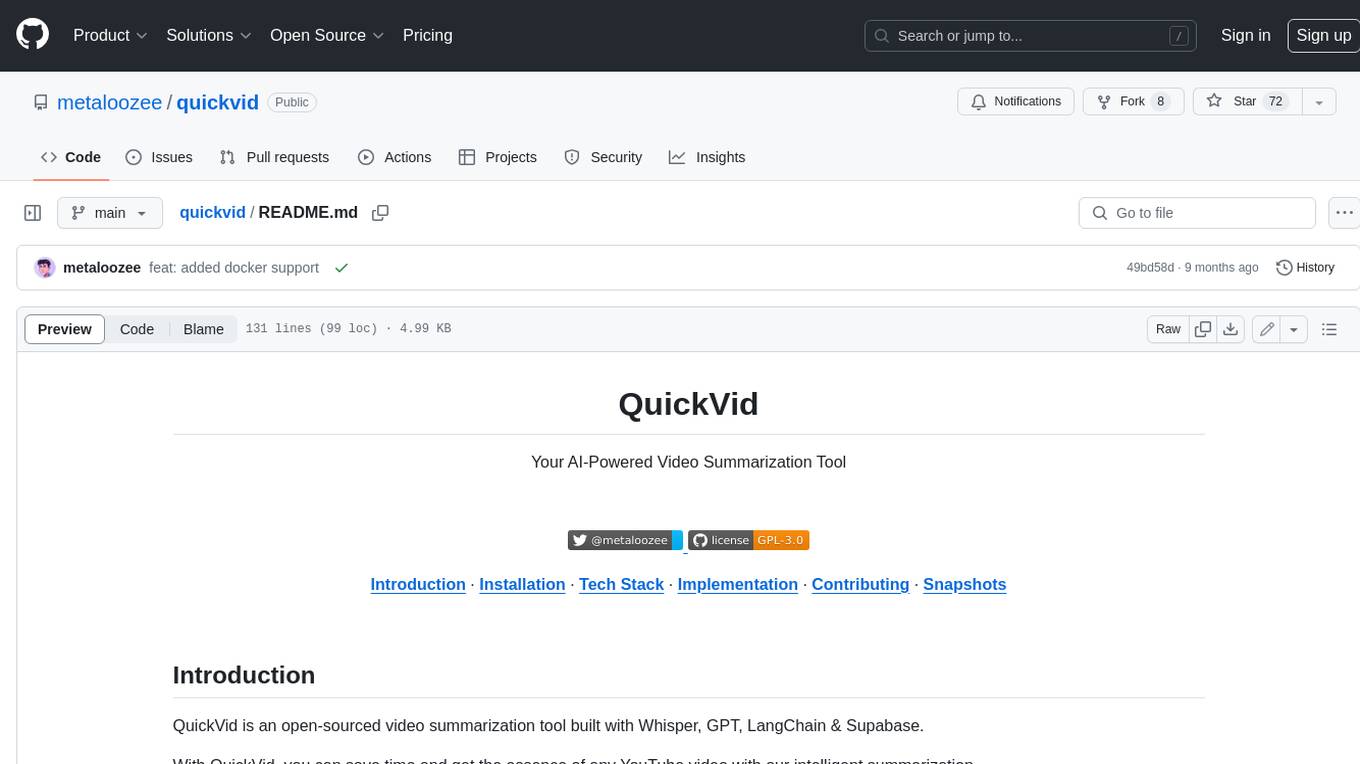
quickvid
QuickVid is an open-source video summarization tool that uses AI to generate summaries of YouTube videos. It is built with Whisper, GPT, LangChain, and Supabase. QuickVid can be used to save time and get the essence of any YouTube video with intelligent summarization.
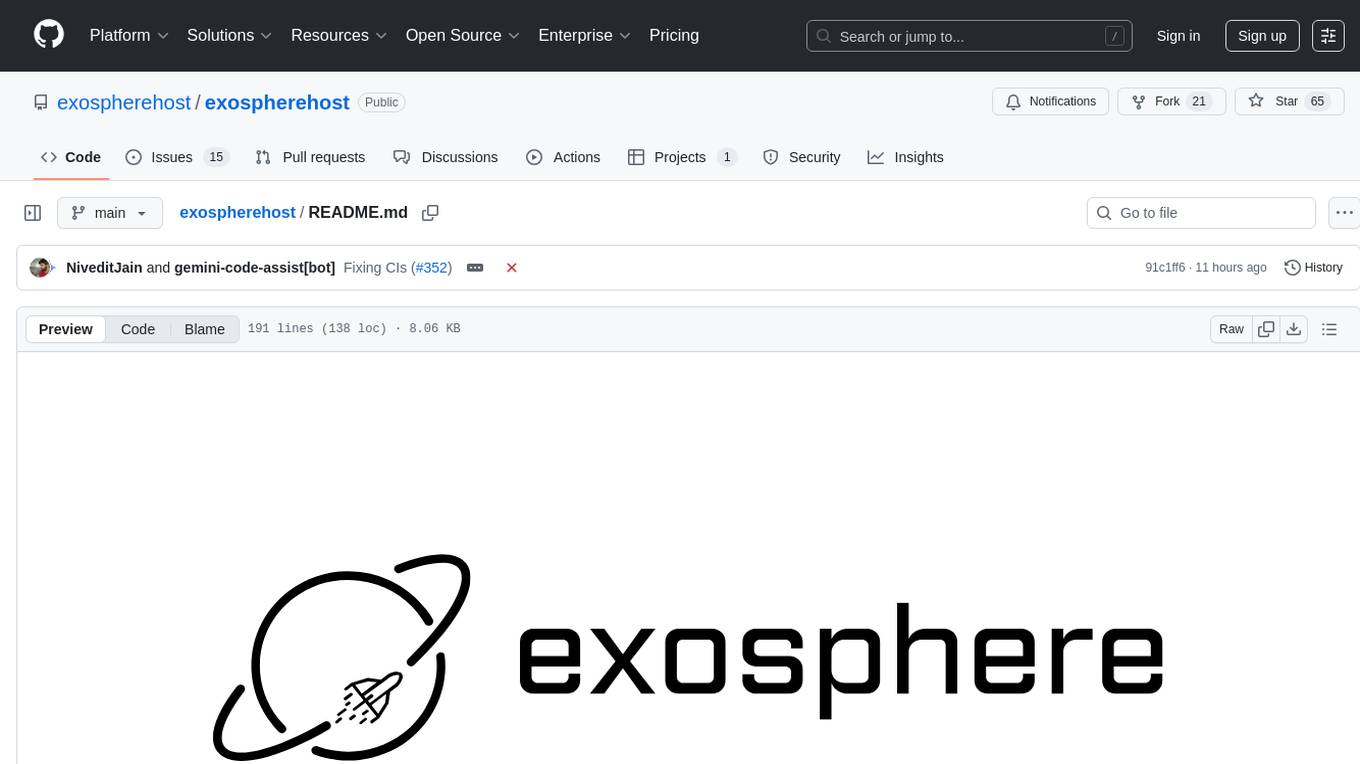
exospherehost
Exosphere is an open source infrastructure designed to run AI agents at scale for large data and long running flows. It allows developers to define plug and playable nodes that can be run on a reliable backbone in the form of a workflow, with features like dynamic state creation at runtime, infinite parallel agents, persistent state management, and failure handling. This enables the deployment of production agents that can scale beautifully to build robust autonomous AI workflows.

refact-lsp
Refact Agent is a small executable written in Rust as part of the Refact Agent project. It lives inside your IDE to keep AST and VecDB indexes up to date, supporting connection graphs between definitions and usages in popular programming languages. It functions as an LSP server, offering code completion, chat functionality, and integration with various tools like browsers, databases, and debuggers. Users can interact with it through a Text UI in the command line.
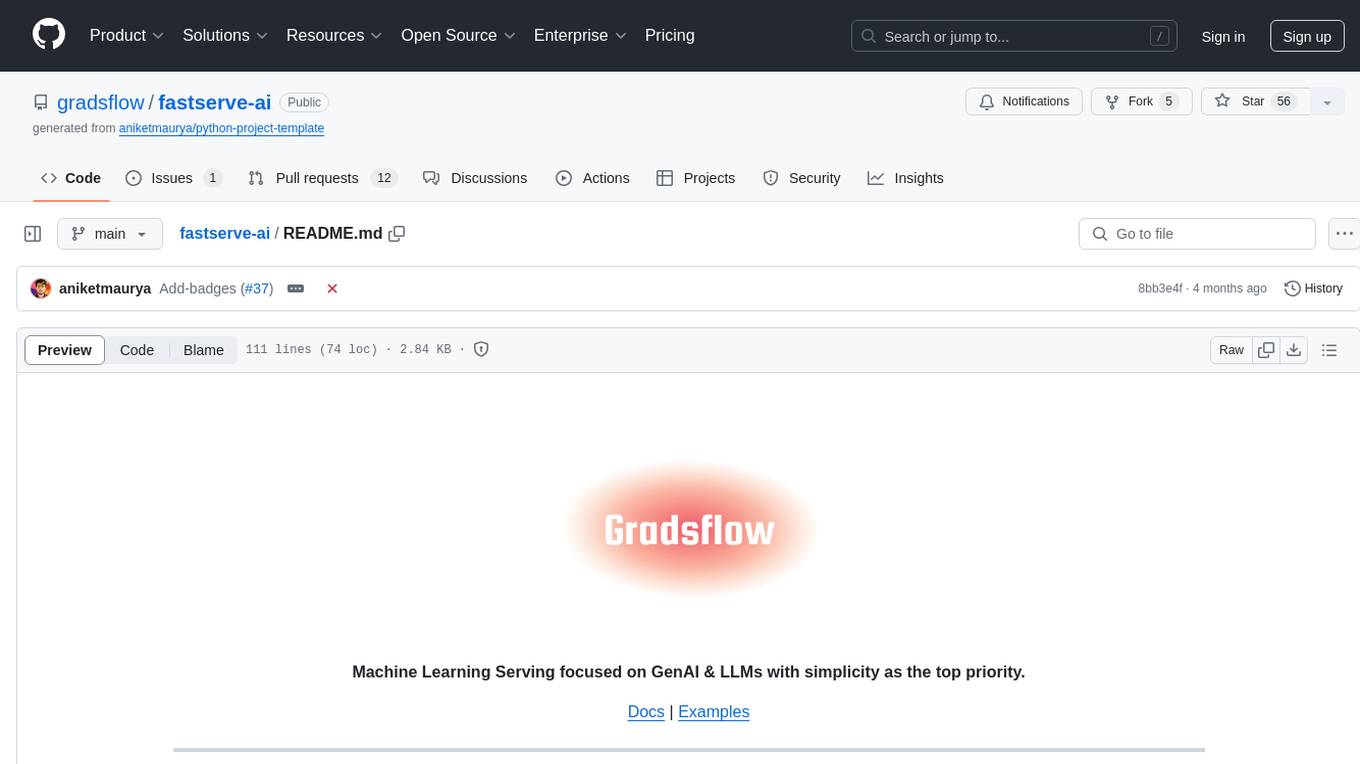
fastserve-ai
FastServe-AI is a machine learning serving tool focused on GenAI & LLMs with simplicity as the top priority. It allows users to easily serve custom models by implementing the 'handle' method for 'FastServe'. The tool provides a FastAPI server for custom models and can be deployed using Lightning AI Studio. Users can install FastServe-AI via pip and run it to serve their own GPT-like LLM models in minutes.

crawl4ai
Crawl4AI is a powerful and free web crawling service that extracts valuable data from websites and provides LLM-friendly output formats. It supports crawling multiple URLs simultaneously, replaces media tags with ALT, and is completely free to use and open-source. Users can integrate Crawl4AI into Python projects as a library or run it as a standalone local server. The tool allows users to crawl and extract data from specified URLs using different providers and models, with options to include raw HTML content, force fresh crawls, and extract meaningful text blocks. Configuration settings can be adjusted in the `crawler/config.py` file to customize providers, API keys, chunk processing, and word thresholds. Contributions to Crawl4AI are welcome from the open-source community to enhance its value for AI enthusiasts and developers.

cognee
Cognee is an open-source framework designed for creating self-improving deterministic outputs for Large Language Models (LLMs) using graphs, LLMs, and vector retrieval. It provides a platform for AI engineers to enhance their models and generate more accurate results. Users can leverage Cognee to add new information, utilize LLMs for knowledge creation, and query the system for relevant knowledge. The tool supports various LLM providers and offers flexibility in adding different data types, such as text files or directories. Cognee aims to streamline the process of working with LLMs and improving AI models for better performance and efficiency.
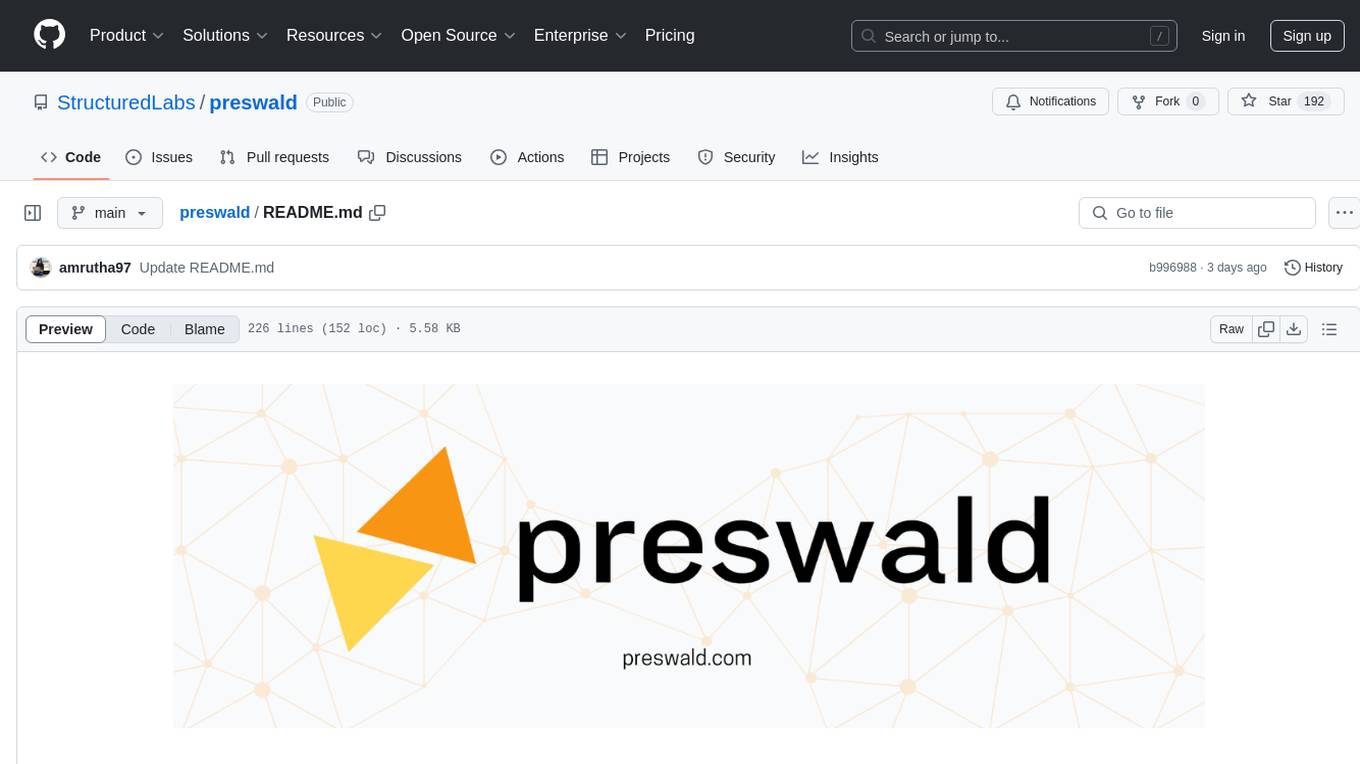
preswald
Preswald is a full-stack platform for building, deploying, and managing interactive data applications in Python. It simplifies the process by combining ingestion, storage, transformation, and visualization into one lightweight SDK. With Preswald, users can connect to various data sources, customize app themes, and easily deploy apps locally. The platform focuses on code-first simplicity, end-to-end coverage, and efficiency by design, making it suitable for prototyping internal tools or deploying production-grade apps with reduced complexity and cost.

nyxtext
Nyxtext is a text editor built using Python, featuring Custom Tkinter with the Catppuccin color scheme and glassmorphic design. It follows a modular approach with each element organized into separate files for clarity and maintainability. NyxText is not just a text editor but also an AI-powered desktop application for creatives, developers, and students.

superagent-js
Superagent is an open source framework that enables any developer to integrate production ready AI Assistants into any application in a matter of minutes.
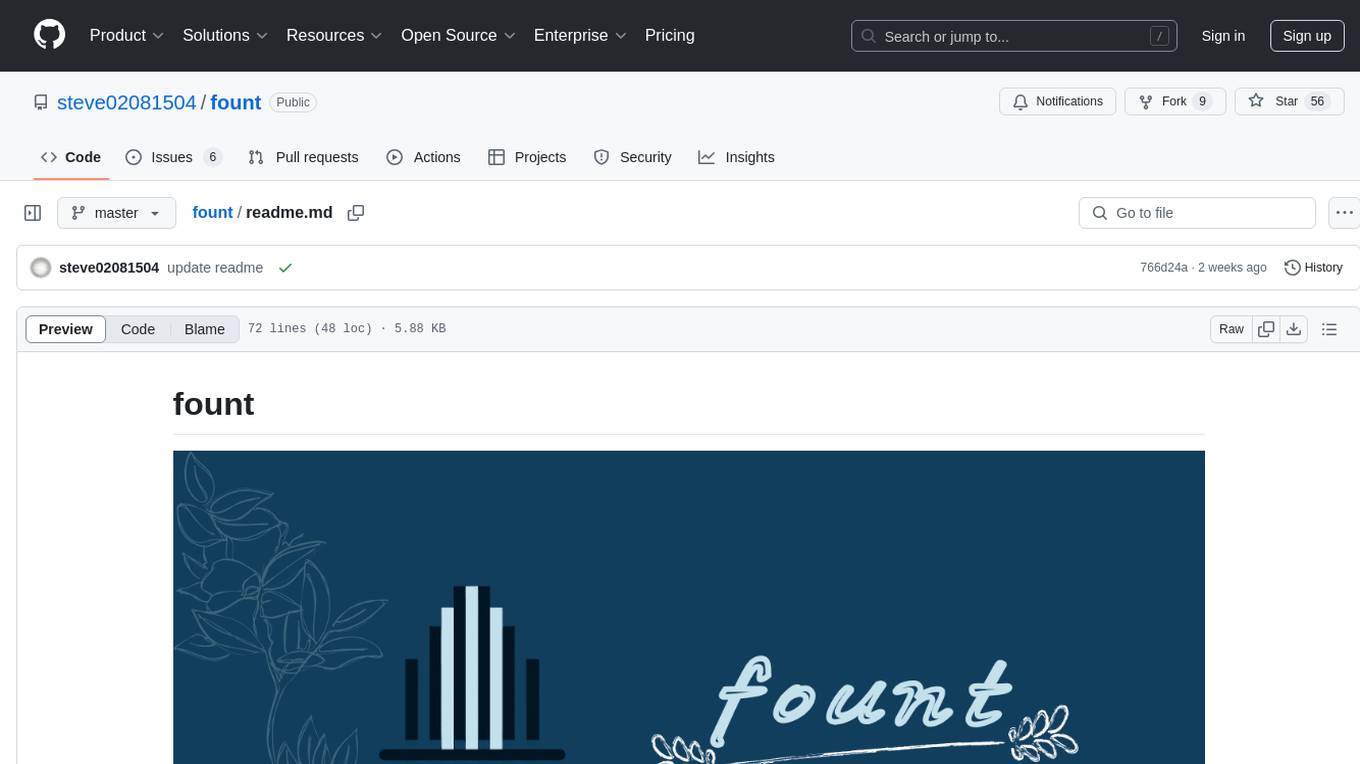
fount
fount is a character card frontend page that decouples AI sources, AI characters, user personas, dialogue environments, and AI plugins, allowing them to be freely combined to spark infinite possibilities. It serves as a bridge connecting imagination and reality, a lighthouse guiding characters and stories, and a free garden for AI sources, characters, personas, dialogue environments, and plugins to grow and bloom. It integrates AI sources without the need for reverse proxy servers, improves web experience with features like multi-device synchronization and unfiltered HTML rendering, and extends companionship beyond the web by connecting characters to Discord groups and providing gentle reminders through fount-pwsh. For character creators, fount offers infinite possibilities with JavaScript or TypeScript code customization, execution of code without filtering, loading npm packages, and creating custom HTML pages. It encourages extension through modularization and community contributions.
For similar tasks

air
Air is a new web framework for Python web development, built with FastAPI, Starlette, and Pydantic. It provides intuitive shortcuts and optimizations to expedite coding HTML with FastAPI, easy HTML content generation using Python classes, and seamless integration with Jinja templates. Air also offers utilities for using HTMX, HTML form validation powered by pydantic, and well-documented features. It aims to combine sophisticated HTML pages and a REST API into one app, making it easy to use FastAPI and Air together.
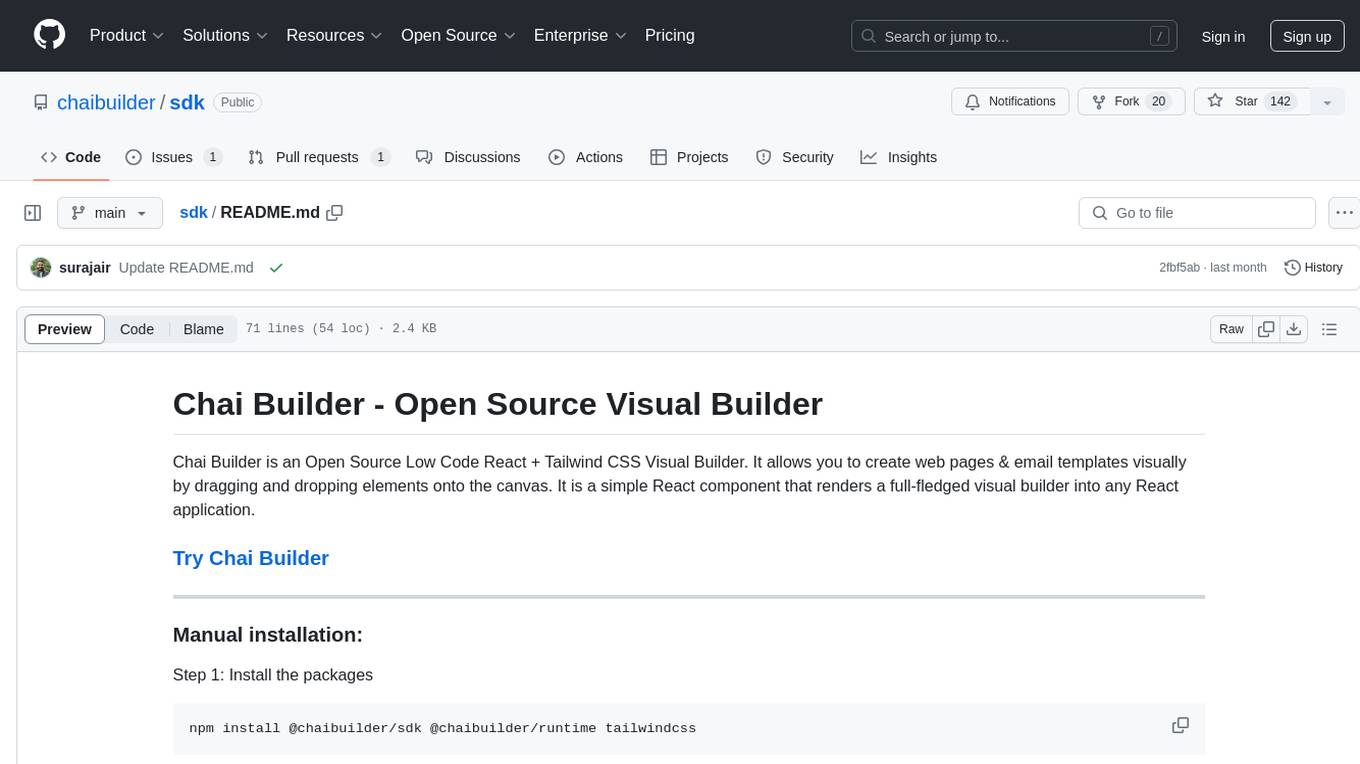
sdk
Chai Builder is an Open Source Low Code React + Tailwind CSS Visual Builder that enables users to create web pages & email templates visually by dragging and dropping elements onto the canvas. It is a simple React component that renders a full-fledged visual builder into any React application. Chai Builder aims to simplify the process of building web pages and email templates by providing a visual interface for developers and designers to work collaboratively.
For similar jobs

resonance
Resonance is a framework designed to facilitate interoperability and messaging between services in your infrastructure and beyond. It provides AI capabilities and takes full advantage of asynchronous PHP, built on top of Swoole. With Resonance, you can: * Chat with Open-Source LLMs: Create prompt controllers to directly answer user's prompts. LLM takes care of determining user's intention, so you can focus on taking appropriate action. * Asynchronous Where it Matters: Respond asynchronously to incoming RPC or WebSocket messages (or both combined) with little overhead. You can set up all the asynchronous features using attributes. No elaborate configuration is needed. * Simple Things Remain Simple: Writing HTTP controllers is similar to how it's done in the synchronous code. Controllers have new exciting features that take advantage of the asynchronous environment. * Consistency is Key: You can keep the same approach to writing software no matter the size of your project. There are no growing central configuration files or service dependencies registries. Every relation between code modules is local to those modules. * Promises in PHP: Resonance provides a partial implementation of Promise/A+ spec to handle various asynchronous tasks. * GraphQL Out of the Box: You can build elaborate GraphQL schemas by using just the PHP attributes. Resonance takes care of reusing SQL queries and optimizing the resources' usage. All fields can be resolved asynchronously.

aiogram_bot_template
Aiogram bot template is a boilerplate for creating Telegram bots using Aiogram framework. It provides a solid foundation for building robust and scalable bots with a focus on code organization, database integration, and localization.

pluto
Pluto is a development tool dedicated to helping developers **build cloud and AI applications more conveniently** , resolving issues such as the challenging deployment of AI applications and open-source models. Developers are able to write applications in familiar programming languages like **Python and TypeScript** , **directly defining and utilizing the cloud resources necessary for the application within their code base** , such as AWS SageMaker, DynamoDB, and more. Pluto automatically deduces the infrastructure resource needs of the app through **static program analysis** and proceeds to create these resources on the specified cloud platform, **simplifying the resources creation and application deployment process**.

pinecone-ts-client
The official Node.js client for Pinecone, written in TypeScript. This client library provides a high-level interface for interacting with the Pinecone vector database service. With this client, you can create and manage indexes, upsert and query vector data, and perform other operations related to vector search and retrieval. The client is designed to be easy to use and provides a consistent and idiomatic experience for Node.js developers. It supports all the features and functionality of the Pinecone API, making it a comprehensive solution for building vector-powered applications in Node.js.

aiohttp-pydantic
Aiohttp pydantic is an aiohttp view to easily parse and validate requests. You define using function annotations what your methods for handling HTTP verbs expect, and Aiohttp pydantic parses the HTTP request for you, validates the data, and injects the parameters you want. It provides features like query string, request body, URL path, and HTTP headers validation, as well as Open API Specification generation.

gcloud-aio
This repository contains shared codebase for two projects: gcloud-aio and gcloud-rest. gcloud-aio is built for Python 3's asyncio, while gcloud-rest is a threadsafe requests-based implementation. It provides clients for Google Cloud services like Auth, BigQuery, Datastore, KMS, PubSub, Storage, and Task Queue. Users can install the library using pip and refer to the documentation for usage details. Developers can contribute to the project by following the contribution guide.

aioconsole
aioconsole is a Python package that provides asynchronous console and interfaces for asyncio. It offers asynchronous equivalents to input, print, exec, and code.interact, an interactive loop running the asynchronous Python console, customization and running of command line interfaces using argparse, stream support to serve interfaces instead of using standard streams, and the apython script to access asyncio code at runtime without modifying the sources. The package requires Python version 3.8 or higher and can be installed from PyPI or GitHub. It allows users to run Python files or modules with a modified asyncio policy, replacing the default event loop with an interactive loop. aioconsole is useful for scenarios where users need to interact with asyncio code in a console environment.

aiosqlite
aiosqlite is a Python library that provides a friendly, async interface to SQLite databases. It replicates the standard sqlite3 module but with async versions of all the standard connection and cursor methods, along with context managers for automatically closing connections and cursors. It allows interaction with SQLite databases on the main AsyncIO event loop without blocking execution of other coroutines while waiting for queries or data fetches. The library also replicates most of the advanced features of sqlite3, such as row factories and total changes tracking.






















